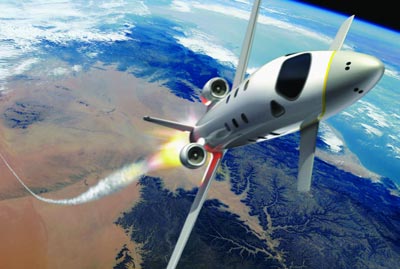Can space tourism survive the economic downturn?by Taylor Dinerman
|
| Space tourism offers something more than just thrilling rides to those that can now afford it. It offers us all a vision of a hopeful future where people can fulfill their dreams and aspirations off this planet as well as on it. |
The test flight program for WhiteKnightTwo (WK2) is moving slowly but steadily ahead, and the aircraft’s performance is living up to expectations. One important aspect of the program is the alternative uses for WK2 that may be keep the cash flowing even if there are fewer suborbital tourists than initially planned (see “Virgin looks beyond space tourism”, The Space Review, February 9, 2009). The uses for the craft for testing UAV components has already been pioneered by Scaled’s Proteus aircraft and with more and more military UAVs being designed and built, a specialized test platform such as the WK2 will have plenty of work to do. Further down the road is the possibility of using the aircraft to launch small rockets into orbit, but so far that is mostly speculation.
Richard Branson’s Virgin empire would seem solid enough to survive the recession and emerge better than ever. The ruthlessness that they showed in closing down their retail outlets is a sign that they do not intend to let today’s troubles endanger the long-term health of the empire. Yet, in uncertain times no one can afford to be too comfortable.
As better times return Branson’s outfit will be well placed to profit from the resurgence of optimism and relief that will inevitably accompany any new growth. This will be particularly true in the US where optimism in a built-in fact of cultural life. Hundreds of Americans flying into space above New Mexico could be a powerful symbol of the emergence of the economy from the slump.
Meanwhile XCOR’s Lynx project just may be the tortoise to Virgin’s hare. The small Mojave-based company is moving steadily ahead towards its first flight sometime next year. Last December they tested their liquid oxygen/kerosene engine and Rocketship Tours, the firm that will operate the first Lynx, hope to have their first revenue producing flight after 2010.
With the current climate, marked by envy and resentment, space tourism is an obvious target for those seeking to blame the rich. However, the NewSpace industry, of which space tourism is only a part, provides hope to millions of people who believe, if only instinctively, that humanity’s future is connected to its expansion into the solar system.
In the long term, free enterprise and the human desire to build a better future will beat envy and gloom every time. Space tourism offers something more than just thrilling rides to those that can now afford it. It offers us all a vision of a hopeful future where people can fulfill their dreams and aspirations off this planet as well as on it.
